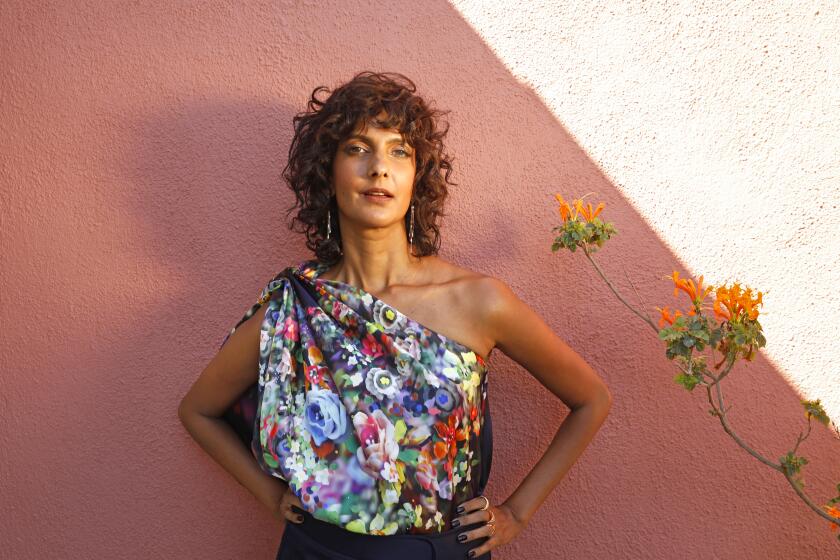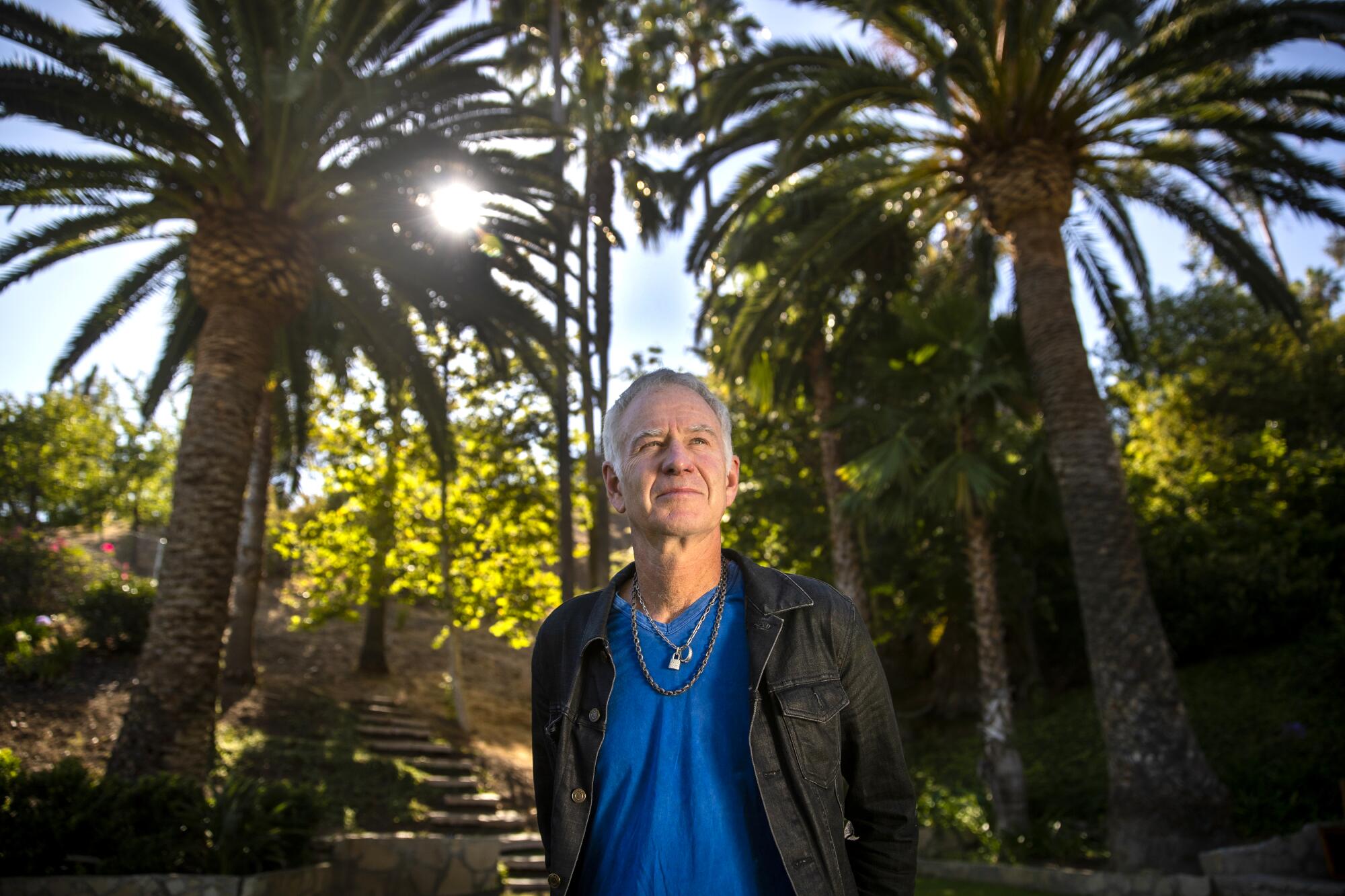
- Share via
If you are over the age of 30, John McEnroe is likely known to you as the infamously brash tennis hall-of-famer — dubbed “Superbrat” in his prime — who now offers his take on the sport as a TV analyst. These days, though, the 62-year-old has taken an unusual career turn as a sage narrator of teen life in Netflix’s “Never Have I Ever.”
McEnroe has answered the call from Hollywood to play himself before, with appearances in “Mr. Deeds,” “Anger Management,” “Wimbledon,” “30 Rock” and “Curb Your Enthusiasm” — to name a few. But narrating a coming-of-age comedy co-created by Mindy Kaling, about an Indian American teen named Devi (Maitreyi Ramakrishnan) who desperately wants to be popular, lose her virginity and get into her dream college was an unlikely choice. (It becomes less peculiar after it’s revealed that Devi’s late father was a great admirer of McEnroe.)
The complete guide to home viewing
Get Screen Gab for everything about the TV shows and streaming movies everyone’s talking about.
You may occasionally receive promotional content from the Los Angeles Times.
Kaling approached McEnroe at a post-Oscars Vanity Fair bash, vaguely pitching the tennis great, whom she’d grown up watching, on the idea of narrating a new series she was working on. (“I remember him being friendly and confused,” Kaling says.)
Video-chatting from London, where he was fulfilling his on-air commentary duties at Wimbledon, McEnroe discussed his unexpected career as a voice artist, his own youthful angst and his thoughts on the mental toll sports can take on elite athletes. The conversation has been edited and condensed for clarity.
For her new Netflix series “Never Have I Ever,” Mindy Kaling picked Canadian teen Maitreyi Ramakrishnan from an open call of 15,000 hopefuls.
When Mindy Kaling approached you at the Vanity Fair Oscar party about narrating the point-of-view of an angsty, boy-crazy Indian American teenager, what was your initial reaction?
You cannot be serious. But I didn’t get the full details. At first, she just said, “[I have] this idea for the show I’m doing and I’d love you to narrate it.” Nine times out of 10 it’s the last time you’ll hear from someone. So, when I actually did hear from Mindy and her people, I was pleasantly surprised.
Over the years, people have said to me often: “Oh, I recognize your voice.” Years ago, when I was probably 25, I was fed up with being recognized — I know that’s sounds terrible — but I wanted to just walk down Fifth Avenue. So I wore this Jimi Hendrix-type wig and a beard. And I was at this gallery that sold tapestries and I saw one that I like so I went in and asked, “How much is that tapestry?” And they go, “Are you John McEnroe? I recognize your voice.”
I didn’t realize until I got into it — I was, like wait a minute: I’m in the head of a high school girl who’s Indian American? And I’m supposed to be like her uncle, as well as her psychiatrist, as well as a few other things? And there’s a lot of lines? I was happy because I’ve done a lot of cameos over the years, [which] are fun, but this one seemed like I was actually, in a way, part of the cast.
What made you say yes?
I like to try to do things that get you out of your comfort zone a little bit. I’ve always believed in the theory [that] it’s better to try and fail than not try at all. And I thought this was different. I saw one interview on one of those entertainment shows where they were speaking to Maitreyi and they were like, “Have you ever thought about who you’d like as narrator?” And I’m like, “Why the hell are they saying that?” She didn’t respond with something like: “Yes, I want Michelle Pfeiffer or I want Mindy Kaling to do it.” I suppose, as you get older, at least with me, you learn to appreciate things more. At certain times, I was disappointed in myself that while I was doing what I was doing — and I was even the best at it — I wasn’t getting the type of enjoyment I would have liked. So it’s nice to sort of do something later on [in life] where you can.
Where do you do most of your recording?
Usually there are a bunch of people and Lang [Fisher, co-creator and showrunner], most predominantly. The first year, it was at recording studios in New York and L.A. This season, it was all Zoom. It’s weird work, narration. Luckily, I don’t do it that much because you want to get it right so badly that you got to keep at it, keep that focus and intensity. Then they’ll be like, “Your voice sounds a little scratchy, maybe we should take a break?” Yeah, no kidding! You do it really hard for a day and then you sort of take a break. I’ve never done more than two episodes in one sitting. I guess it’s a easier than a lot of things, but it’s sort of fatiguing mentally.
After defying stereotype in small, potent roles in “The Night Of,” “Ramy” and more, the actor finds her biggest platform yet in Netflix’s “Never Have I Ever.”
Have you developed a routine? Anything you do to keep your voice in top shape?
Obviously, water would be the key thing. My wife [Patty Smyth] is a singer. She’s like, “Eat green apples, they’re great for the voice!” And then years ago, not to drop names, but I was at a Neil Young show. He was doing a solo thing at Radio City and I spent a few minutes with him backstage after the show and I was like, “God, your voice sounds great, unbelievable. As good as it’s sounded in 30 years.” And he said something like, “Nothing like a good lemon.” I sort of combine those three, if I need to.
If you could pick, who would be the narrator of your teenage years?
Jack Nicholson. He’s my favorite actor, so I’d love to hear what his thoughts would be, like [mimicking Nicholson], “Johnny, what are you doing?” He said to me once in the mid-’80s, “Don’t change a thing!” And I remember thinking, “Jack Nicholson just told me not to change the thing and everyone’s like, ‘He’s got to behave better or we’re gonna throw him out of the game.’” Who am I gonna listen to: some old guy at the U.S. Tennis Association or Jack Nicholson?
I love “Charlie’s Angels.” So if we’re going to do something completely bizarre or total opposite where it’s a girl that’s doing teenage John McEnroe thoughts — I mean, it gets complicated with Farrah [Fawcett] because I have a connection. Not that I didn’t have her poster on my walls as a kid, but it became bizarre as we got older because we spent a fair amount of time around each other for a while. Jaclyn Smith might have been my favorite. I probably would have thought of someone that was another athlete, like Larry Bird or something, because Larry Bird and I are completely different.
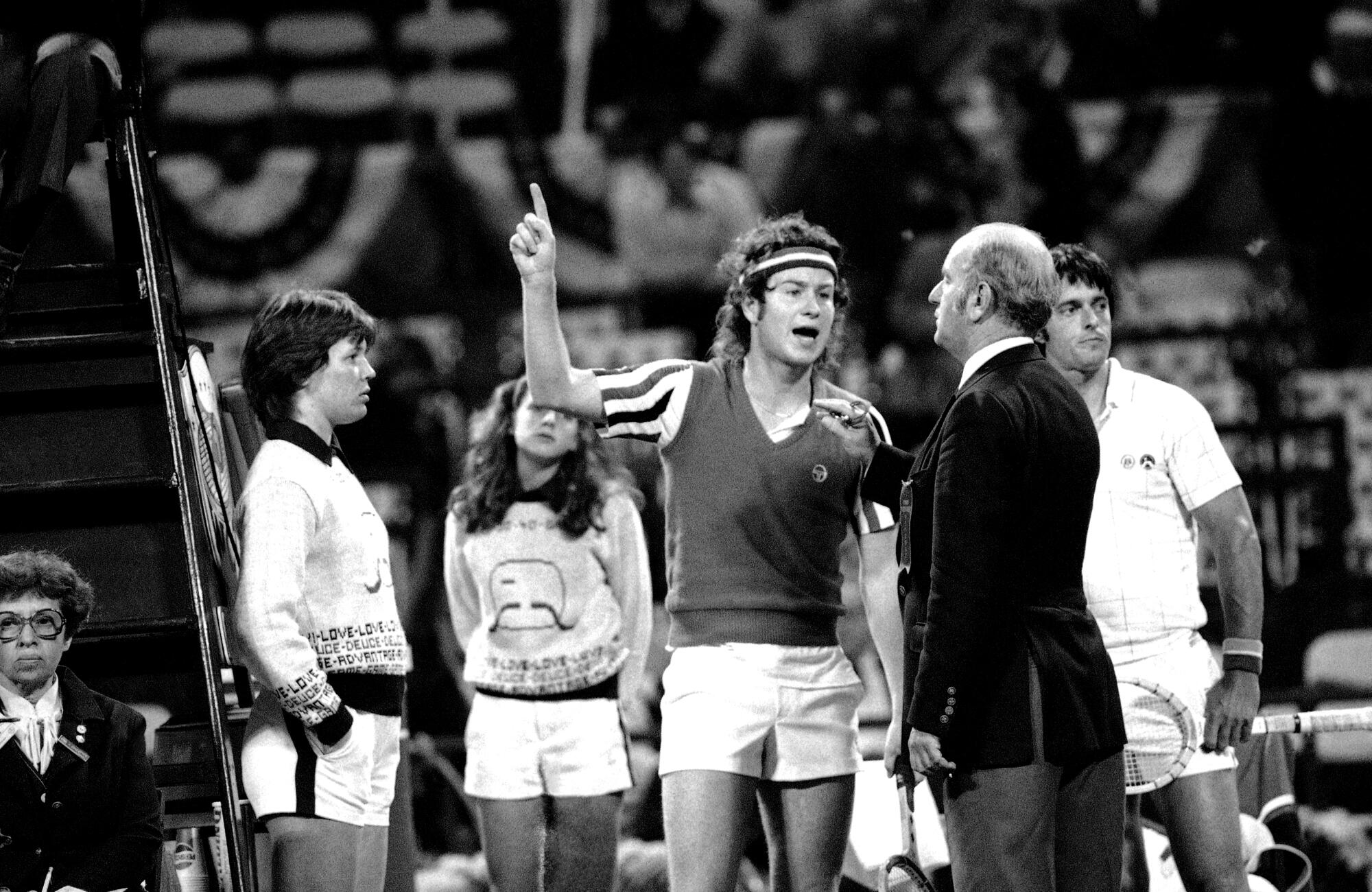
Some of the best parts of the show are when you, as the narrator, are incredibly invested in the lives of the characters. Tell me more about teenage John McEnroe at Trinity School. You were not that much older than Devi is in the series when you became a tennis star.
Growing up was the toughest time in my life. My life changed here [in London] in 1977, when I reached the semifinals and all of a sudden it got a whole lot better. Not immediately, but pretty quickly. High school and grammar school was ... it just felt like it was not easy. I was in an unusual situation in high school because I commuted into Manhattan. Even though it’s a great private school, I was away from all my friends where I grew up in Queens and it alienated me from both sides a little bit. So through sports, I was able to have friendships and teammates. That was really important, but I could feel sort of isolated. You never want to feel that.
Devi and I are probably very similar in the sense that I was girl-crazy but I didn’t have much to show for it. I was sports-crazy — obviously, I was the best at tennis, but I played high school soccer, I played high school basketball, I played all the sports growing up. I was just a big jock-type guy. And I always was thinking: “Why don’t these girls understand how cool a guy they’re getting here?” Or so I thought. And then I was like, “God, maybe I’m not very cool because this isn’t playing out the way I anticipated.” I remember when I made the breakthrough [at Wimbledon], and I came back to the states and I eventually went to Stanford for a year. I walked in there thinking, all right, the girls are just going to be falling all over me now, and then they just didn’t give me the time of day there either.
We compare Chrissy Teigen’s earlier version to Gigi Hadid’s, released today with the premiere of the Netflix comedy’s second season.
How much did the tennis world feel like an extension of high school, in terms of finding your place and navigating the scene and being comfortable as yourself? Were you thinking, “How can I be as cool as Björn Borg?”
For sure, I looked up to people like Björn Borg and Vitas Gerulaitis; Jimmy Connors was the biggest guy in tennis. I just wanted to somehow figure out a way to be in the mix with them, be thought of in the same way, to possibly be remotely as cool as they were. They strutted their stuff and backed it up — ultimately, you can talk all you want, but if you don’t back it up, it doesn’t amount to a whole lot. So, it was a bit overwhelming for a while. That’s why I think going to college was one of the best things that I ever did. It gave me a chance to sort of be a kid another year longer and be around kids my own age.
Have you learned anything about your own youthful angst in the process of narrating the series?
I don’t know if I’ve learned that much about myself. But it has been interesting to keep an eye on it from a distance — where [the cast members] are headed. Maitreyi, who plays Devi, she never acted professionally and all of a sudden she’s doing Mindy Kaling’s series. That’s big — thousands of people tried out for the role. That’s quite the life-changing experience. I don’t know where that’s gonna lead her. She could win an Academy Award in 10 years for all we know. And that would be, like, from where I began winning Wimbledon and being able to succeed. So, hopefully, the next time they ask her after Season 2, “Hey, do you think there should be another narrator?” she’ll say, “No, I think John’s pretty good. I want to keep it John because it’s working his way. If it ain’t broke, don’t fix it.”
Critic Lorraine Ali writes of seeing her immigrant upbringing in the San Fernando Valley reflected in the Mindy Kaling Netflix comedy ‘Never Have I Ever.’
Would you say the John McEnroe of today is calmer?
I’m definitely better at taking the deep breath. That doesn’t mean I don’t fly off the handle at times. I was so impatient with everything [when I was younger]: “Why did you say my name that way?!” In the warm-up, I’d be so amped up. When you walk on a court, it’s like a lion in a cage — you’re letting them out, that’s the idea to me. You come in with such an intensity. Because it’s not like I blow people over with how strong I am or how tall I am. You’ve got to bring something to the table. And I think what I brought was an energy and an intensity that you sort of like build the whole day and then you let it out. That’s why I got myself in trouble, because if you said hello to me the wrong way, I’d tear your head off.
Naomi Osaka has cast a spotlight on the rigors of being a professional athlete and the mental toll of it all. What are your thoughts on what she’s raised about mental health?
It’s extremely important, probably more so than ever because of this pandemic. I felt like my legs were shaking the first time I stepped foot at 18 [years old] on the center court of Wimbledon. I felt like I lost the first set before I even hit a ball — and I think I did. It was overwhelming to play Jimmy Connors and to have all these people. ... I found that I was more nervous going into the press conference. So I can relate to what she’s saying and I sympathize with it.
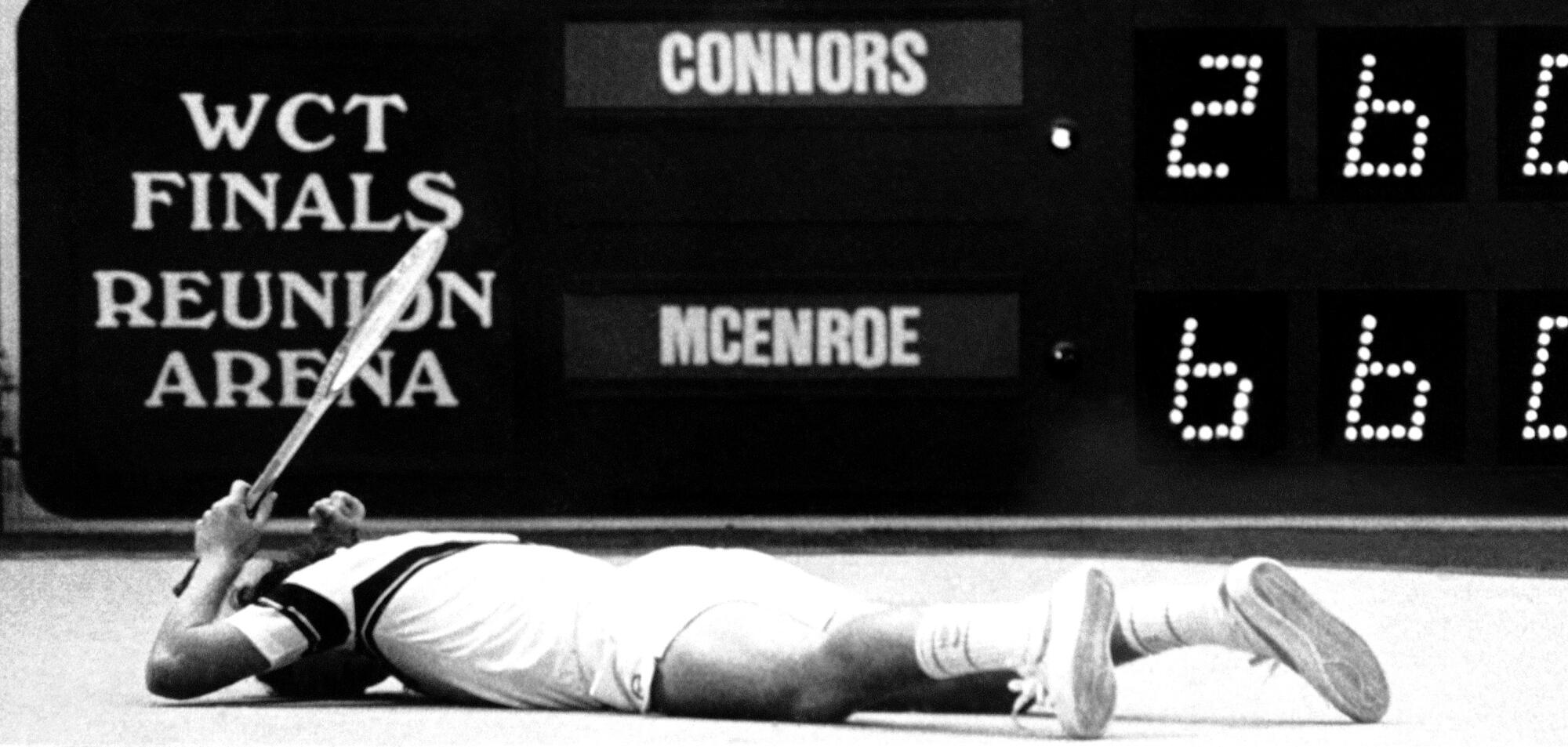
It’s this very tricky juggling act because she’s very introverted to begin with. I’ve rarely been able to get more than a few words out of her. And I’m on her side because I want to see her flourish because it’s good for the sport. She’s a big star. When she went out last year at the [U.S.] Open, and she was wearing the mask with George Floyd’s name, it really had a big impact, I think, for us as a sport that she was sending a really strong message. My concern is just, as someone who’s been around the block a few times, that the scrutiny is only going to intensify. It’s not going to get less. Hopefully, she’ll get better equipped and feel good about it because she’s obviously a tremendous player.
Times have changed. People can go on their own social media accounts and say, “Well, I felt this way about this match.” And they can do it sort of like a press conference without having to do one. I don’t do that but some people do. And it begs the question of like, “How much do you need the press as part of what you’re doing?” I always respected the press that were traveling around and really cared about the sport — not the Tom, Dick and Harrys that come here at Wimbledon and try to get me to say something stupid [that would] sell newspapers. She’s the highest paid female athlete in the world, so if someone that makes tremendous sums of money can’t handle it, you’re like, “Whoa, wait, something’s wrong with this.” So hopefully it’ll get better soon.
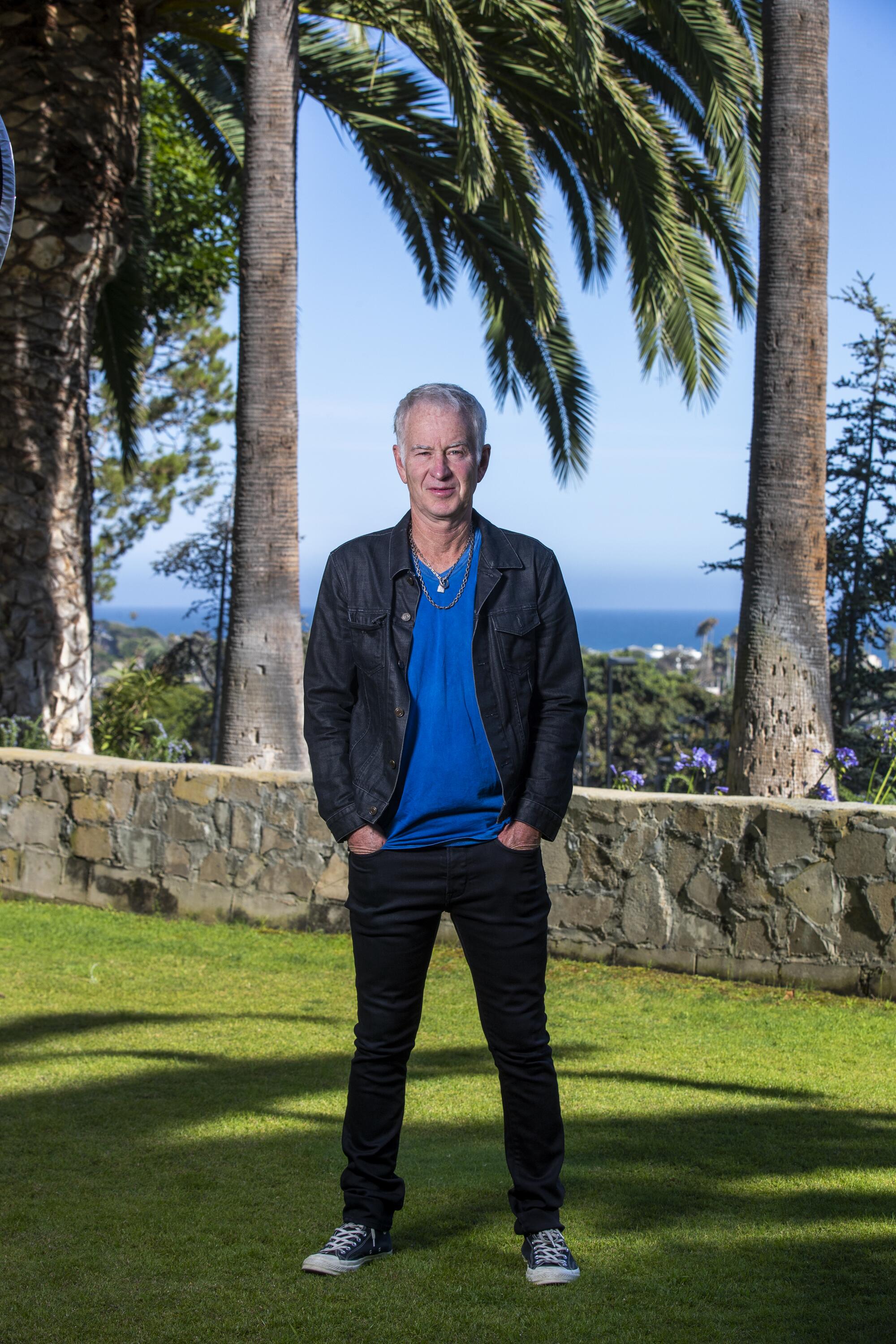
Has it made you reflect on your on-air commentary of the games? You recently drew criticism for your remarks about British tennis star Emma Raducanu’s decision to withdraw from a match. You speculated that it was because she couldn’t handle the pressure. Are you thinking about your role in the whole machine and the impact of your words or how they’re received?
Yes and no. I think it’s important to be myself. I hopefully mature as I get older. I remember dismissing a player many years ago at the Australian — saying he shouldn’t be on the same court as, at the time, the No. 1 player in the world. And he shouldn’t have been on that court. He got blown off the court. But afterwards, his coach came up to me in the locker room: “This kid worked his whole life to just to get in the Australian Open, how can you dump on his work?” And it did take me back and make me realize the journey of a lot of people, the journeymen and -women that you’ll never even talk about. So, from that perspective, I definitely feel like hopefully I’m more aware. I still believe I should be myself and that’s what I’m hired to do.
As far as what I said about Emma Raducanu — I absolutely believe that what I said was 100% accurate. I mean, I didn’t know for sure at the time, because it had just happened. It was sort of an educated guess based on decades of experience. And it certainly appeared like it got the best of her for a variety of reasons, a lot of which are understandable. She seems like she’s got the goods and potentially could be a really good player.
When I played Wimbledon for the first time with Jimmy Connors, I remember — and I said this when I was making comments about Emma — I was glad that I lost against Connors. I felt like it was too much too soon. I couldn’t handle it. And I’ve literally gotten sick. I think anyone that told me that they haven’t felt that would be lying — I don’t know if there’s a player in any sport that doesn’t. But it’s how you navigate that. It’s a tremendous thing to be able to do for a living something that you love, like being a professional athlete, but at the same time, you’re out there naked, more or less. If you’re laying an egg, or something’s going wrong, it is a horrible feeling.
Why they made a big deal out of it, I have no idea. I’ve said far worse, believe me — some things that I’m sure I deserve to be criticized for.
More to Read
The complete guide to home viewing
Get Screen Gab for everything about the TV shows and streaming movies everyone’s talking about.
You may occasionally receive promotional content from the Los Angeles Times.
